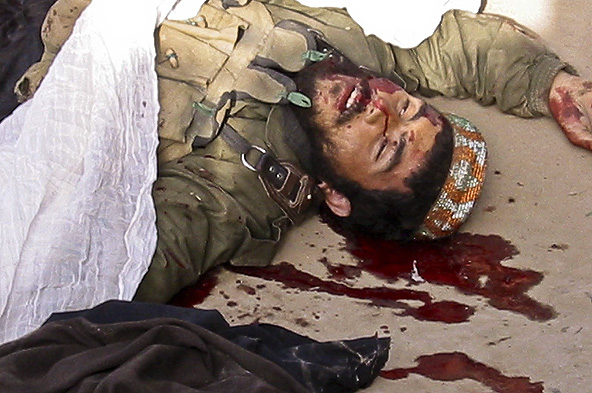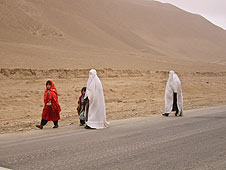
26 November, 2001, Kunduz, Afghanistan. A dead Taliban fighter lies on the street.
Photo: Phillip Robertson
Dec. 3, 2001 | KUNDUZ, Afghanistan
Finally, at the end of a long, erotic and confusing duet between the beauty and her bookish partner, the title of the video flashed up on the screen, "It's All About Loving Your Parents." Sion, the photographer, involuntarily coughed up an egg fragment that shot across the room. The Afghans stared at the video. It was time to head up to the front at Bangi.
On the road, Uzbek peasants were driving their donkeys to the market in Taloqan, loaded down with firewood and rice, while fighters carrying their Kalashnikovs and blankets were thumbing for a lift to Bangi. As we passed the dead village of Chun Zai, there was a row of white stones placed across the road which forced Amin to slow down a bit and mutter a long string of complaints in Dari. When I asked what the roadblock meant, he would only say that it was the work of the Pashtun villagers. Amin is a Tajik and doesn't care much for Pashtuns, the ethnic group that makes up the majority of the Taliban fighters. The stones, laid in a trail of disconnected vertebrae across the road, did not seem like a good omen. Anything that slowed the jeep down in the middle of nowhere was a bad thing, and when the jeep had to stop in the middle of nowhere, it was a full-blown crisis. We hated unscheduled delays. So Amin drove over the rock barrier at 40 miles an hour.
When we made it up to the front, a hill overlooking the long Bangi River valley, Sion went off to take photographs while I walked around trying to keep warm. The mujahedin were resting on carpets of hay, utterly bored. I sat down with them. Abdul Rakhman, a fighter, came up to me to explain that when Ahmed Shah Masoud died, Abdul had died also. I said, "But you are very much alive." Abdul nodded. "Ahmed Shah Masoud was the father of all mujahedin, that's why when he died, we all died."
Masoud, the charismatic Tajik commander of the Northern Alliance, was assassinated by agents of Osama bin Laden shortly before the Trade Center bombings as a favor to Mullah Omar, the Taliban leader. In this part of Afghanistan, Masoud's image is everywhereon vehicles, across the walls of housespart of a cult of personality which has elevated him to the status of a secular saint. Children are named after him.
Abdul then asked me the question I heard all the time. "Can you take me to America?" He was having trouble with his Kalashnikov, the stock was dragging on the ground because Abdul is very short. Abdul is very short because he is nine years old. He spoke of America as if it were heaven. I told Abdul he could come to America with me but he would have to travel as checked baggage, or in a very small box with air holes punched in it. When he heard that, he jumped up and down, overjoyed, thinking it was a done deal. The joke started to crumble out from under me. The older fighters in Abdul's unit laughed like crazy.
"Going to America is not like going to the bazaar," I had to explain, "There are all sorts of permission letters, visas, plane tickets and passports which make the journey difficult for an Afghan. When it is night here, the sun is shining in America, that's how far it is. My house is on the other side of the world." Abdul said he understood, but he looked stricken as he walked back to his friends.
There were movements on the front line, so I went up to figure out what was going on. Everyone was talking about Taliban defectors from Khanabad, the nearest opposition held town, and how they were due any minute. I walked down to the stone bridge where commander Nazir Mohammed said that the defectors were not going to come down the main road, where they were likely to be shot by foreigners within the Taliban. Instead, they would take a longer route along the foothills through a village called Amirabad. Sion reappeared and we hiked off to go get Amin so we could drive most of the distance. When we found him, he had the jeep's engine in pieces, and was happy to tell us that we couldn't go yet. It was an extremely clever technique of avoiding the drive through the front, but we made him put everything back together in a hurry, and then piled into the jeep desperately worried that we would miss the show. On the way to the Amirabad road, as we rolled through the abandoned village of Choga, we saw the first truckload of Taliban defectors.
As they passed us in the back of their captured pickup, the crowd of young Pashtun fighters in black turbans looked at us with incredible hatredan axiomatic and unshakable hatred I'd never seen before. I waved at them. They did not wave back. We kept going, finally parking the jeep in a clearing with a few Northern Alliance vehicles, where we promptly stepped out into a black and white photograph. This side of the valley was extremely dry, with no trees and no vegetation. The low river, now reduced to a pitiful stream, barely providing any nourishment at all.
As we headed out to Amirabad on foot, skirting the mountains, we joined a long line of fighters going down the road toward the place where the Taliban commander, Amidullah Khan, was to surrender. The distance, as it turned out, was several miles, much farther than we had guessed, all of it below bluffs and escarpments which made perfect cover for snipers. Sion said he felt like the last man on earth. Soon, we had walked farther west than we had ever been, the front on the northern side of the valley being much closer to Khanabad, and therefore much closer to the Taliban controlled zone. Two days before, the mujahedin had retreated in a panic from this exact spot, leaving it in no man's land, so we all felt a little nervous without Amin there to drive us back to Bangi.
 LEAD IMAGE: 20 November, 2001. Refugees on the road before the fall of Kunduz to the Northern Alliance.
LEAD IMAGE: 20 November, 2001. Refugees on the road before the fall of Kunduz to the Northern Alliance.Photo: Phillip Robertson
To contribute or commission a new Afghanistan assignment, click here.
© Phillip Robertson, 2009-2014.
